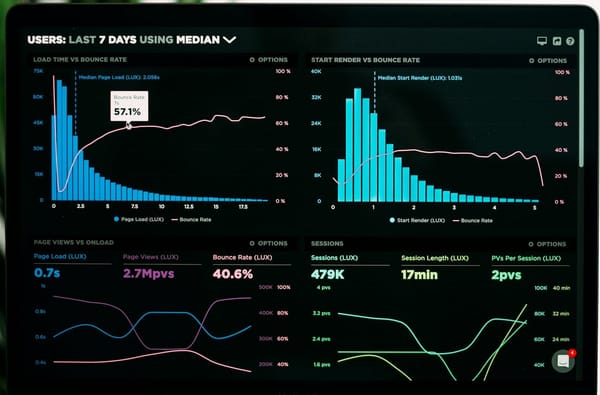Why privacy matters
And practical steps you can take to improve the protection of your personal data...

Privacy is a subject which, in today's increasingly dystopian and puritanical society, is becoming ever more relevant and urgent.
And you don't have to have anything to hide either. Privacy is an inalienable human right. We have the right to have our lives, thoughts and personal beliefs remain our own personal and private business. Nobody else's, and certainly not governments or corporations.
When privacy rights are abused, it pushes society even further towards a surveillance state, one in which governments and corporations exercise unchecked power over the populace. Invading every facet of our lives, dictating what is acceptable, and what we can or cannot say, see, read, watch or even think.
America, currently, is on a clear and obvious slide into authoritarianism and eventually a full on fascist state.
The UK, sadly, is on the starting steps of a similar journey, which is ironic because I always thought it would be a Conservative government that would begin ushering it in, not a Labour one.
What can we do?
The first step we can take, is by gaining control over our own privacy.
Every step on the road to making our lives a more private one is a small, but necessary one, to reclaiming our information and data rights from Orwellian overreach.
De-googling
This is the process of switching away from the usage of the many Google services and products that many of us use on a daily basis.
Here are some changes you can make, varying in levels of commitment needed:
- Chrome > Firefox / Vivaldi 1
- Search > Kagi / Duckduckgo 1
- Gmail > Proton / Tuta
- Docs > Libre Office
- Android > GrapheneOS / iOS
- Drive > Proton Drive
1 I'll come back to search and web browsers later, as there's more I want to say about both.
You get the idea. For every Google service and platform, there will be a privacy-respecting alternative service available not run by Google or so-called "Big Tech" platforms.
The only exception to this, for me, is YouTube.
Alternatives do exist, such as PeerTube or Odysee, but they simply don't have anywhere near the levels of content that YT has. But that's largely on Content Creators to start using these services in conjunction with YouTube, then eventually, after hitting critical mass, switching away from it altogether.
Leaving other Big Tech behind
The act of leaving Google behind is just the first step.
Other big tech services and platforms such as those run by Meta, Microsoft and Amazon, are equally important to switch away from, for better alternatives.
Now, there are certain aspects of Big Tech that you will never, no matter how much you try, be able to avoid using. Things such as Amazon's AWS (Amazon Web Services) sit behind approximately a third of the web services that you use on a daily basis. Meta's infamous tracking pixel is currently used by millions of websites around the world, and Microsoft's Azure cloud solution, similar to AWS, sits behind some of the largest sites online such as LinkedIn etc.
With all that said, you can minimise your active use of these services, by following a similar course of action to de-googling.
- Windows 11 -> Linux
- Office 365 -> Libre Office
- Instagram -> PixelFed
- Facebook -> Friendica
- WhatsApp / FB Messenger -> Signal
- Threads -> Mastodon
- Amazon Store -> Any other online shop
- Kindle -> Kobo Books & e-Readers
Again, you get the picture. For each of these services there exists an alternative that isn't run by Big Tech, and in most of these cases is a privacy-respecting option.
Admittedly, some of these are not a one for one alternative in every respect. Libre Office as an example, is entirely offline and doesn't have cloud backup built in. However that may actually be a positive for you, as it is for me.
And things like switching out Facebook and WhatsApp may be much more difficult to do, given that others, such as family and friends, also need to make the jump in order to make the switch a worthwhile one. I certainly live in this situation where leaving WhatsApp behind for Signal is difficult, as my family are, much to my great pain, deeply entrenched in the Meta ecosphere.
Browsing & Search
I specifically wanted to talk about these separately.
Your web browser, be it on mobile (as most web traffic is nowadays) or on the Desktop, is one of the most frequently used applications we all utilise. It is our window to the wider world of the internet, and is largely core to our online existence.
As such, your choice of browser is incredibly important. Sadly, most people will stick with one of two "default" alternatives: Google's Chrome, or more increasingly Microsoft Edge, based of course on the Chrome browser (or at least Chrome's parent browser, Chromium).
There are of course many, much better alternatives to these choices available.
Firefox
Firstly, would be Firefox. Firefox is the last, real bastion standing firm against a complete Chromium monopoly, based as it is on the Gecko engine, rather than Chromium. Sure, Safari's Webkit exists (taking up a desktop share of 7.34%), but it, like many others, is far from a challenger to Chrome's supremacy.
Recent statistics put Firefox's desktop share of the web browser market at somewhere around 6%, even less than Safari. Approximately 1 in 17 web users use Firefox, while 86% or more use a chromium-based browser, and two-thirds use Chrome itself directly.
On Mobile the picture is even worse, with Firefox grabbing a whopping 0.5% of the market. Safari on mobile by comparison has about 20% of the market, thanks to iPhone users.
Firefox though has other issues. The main one being Mozilla, the not-for-profit organisation that owns Firefox. Their stewardship over the past 3-4 years has been increasingly called into question, with a string of bizarre decisions.
CEO pay upwards of $6 million (for a non-profit need I remind you), integrating AI, buying an ad company to incorporate their own ads, questionable design choices... the list goes on.
The good news is that there are numerable forks of Firefox available (A fork is when someone takes Open Source code, which Firefox is, that anyone can copy and use or modify their own way - the joy of FLOSS 😉).
There are many more, but those are some of the more well-known forks.
Tor Browser of course is incredibly important, as it's one of the best privacy and secrecy-based browsers available, and is literally saving lives in countries with totalitarian oppression of free speech such as China and Russia.
The rest you can check out, and see if you like them. Some of them are strongly recommended, such as Librewolf, while others such as Midori and Pale Moon are either just less popular or are simply newer forks.
2 It should be noted that Pale Moon doesn't use the Firefox Gecko engine, instead using the Goanna engine. It was forked from mature Firefox code.
Vivaldi
Why am I recommending a chromium-based browser? Yes, Vivaldi is based on the chromium source code, and isn't 100% open source. So why is it my current daily driver, on both mobile & desktop?
The Vivaldi ethos is one I am strongly aligned with. They are a privacy-conscious company, treat their users with respect, and do not monitor their users' browsing history, unlike Google & Microsoft. Everything they do with the browser is centred around user privacy and customisation. Vivaldi is one of, if not the most customisable browser available.
As for their code, their interface customisations espoused above are proprietary code, but the rest of the browser, the other 99% of it, is completely open source.
They offer a confidential and private sync of data between browsers, so I use it on Windows, Android and Linux.
Firefox also offers this service as well, for clarity.
Search
Search is one of the biggest sources of data harvesting on the web.
For Google it was the OG, their original and only product. Once they had gained a grip on the search market, they then switched from a Search company to an Ad company. Selling ad-space in their search results earns them billions of dollars per year.
In 2024 alone, Google earned $264 BILLION dollars in revenue, just from their Ad business.
This is from the ads and sponsored links in their search results, the ad spots they place in YouTube videos, their external ad placements on websites across the web... everywhere. Millions, nay billions of people every year get served up ads either placed by or directly marketed by Google.
And how do they know which ads will work best with YOU specifically?
Data Harvesting
Why do you think Google spend so much to maintain Chrome?
Why do you think 90% of Mozilla's income is from, you guessed it, Google?
They do this for two reasons: To have Firefox's default search engine be Google, so they can continue to harvest data on the one web browser they don't control.
The other is so that Firefox doesn't die. Noble you might think, until you realise that if Firefox doesn't die, Google doesn't get broken up for monopolistic reasons. Although in the US that might be less of an issue these days, not boding well for Mozilla in the long term...
With all of Google's snooping on your browsing habits, knowing the sites you visit (via cookies and placed ads), knowing the things you like to read, browse, purchase and so forth, they will have millions of data points per person, enabling them to specifically target you with adverts that they know will appeal to your specific tastes and needs.
All of which, is a very long-winded way to re-iterate that Google search is not the best or most private option out there. There are multiple others, most of which are free, but the one I'm going to recommend is a subscription service.
Kagi
Yes, I pay to use a search engine.
Why? Well, as you might have guessed, Kagi are a privacy-focused organisation that have one paid product: Search. It is in their economic interests to serve you, as a paying customer, with the best and most relevant results.
And it works.
The results I get from Kagi are, without exception, superb. I never have to click to a page 2 to get the result I need, and I regularly never have to scroll down to a 4th or 5th result either.
The other thing I don't have to do is scroll past umpteen "sponsored results". Kagi doesn't use them, because they don't need to. They're getting their revenue from you directly, so there are no ads, no sponsored links, nothing shady.
In fact, if you don't like the results you get, you can configure them, by raising or lowering importance of website results, or if there's a site you REALLY don't want to see results from? You can block it entirely so you never have to see results from that domain ever again.
They allow non-subs to use the search portal for free for 50 searches or so, and if you sign-in with an account, you can carry on for another 100 searches before you have to start paying.
Honestly, I find it worth the $10 a month I pay, as I usually make between 300 and 400 searches per month (they give you stats on your usage).
And yes, all of your searches and results are completely private. They don't log any searches, they tie nothing to your account, and they have a completely anonymised search option available (Privacy Pass) if you truly want your searches to be private.
Other Search options
There are other, free, options available of course that have more privacy in mind, with varying results quality.
To name but a few. Quality of results vary across most of these options, and a lot of them are simply anonymising front-ends to other services such as Google (StartPage), Bing (StartPage again/DDG/Qwant/Swisscows) etc, and clearly being free will feature ads and sponsored links/results.
Brave is notable here, as they utilise their own search index (as does Kagi), rather than relying on results from other search engines.
Qwant also have their own indexed results, but fallback on Bing results for some searches, particularly with image search.
What all of the above will do however, is keep your data away from the grubby mitts of Google or Microsoft, which is a big win IMO.
VPNs
Who uses a VPN? Why should one be used?
For a start VPN use has become a lot more commonplace over the past 5 years since the home-working trend really kick-started with the Pandemic in early 2020. Most remote workers will use one to connect to their corporate network in order to work from home.
Normal people also use them, for example to stream shows on Netflix for example, that aren't available in their home country.
Beyond that, most privacy-conscious people tend to use them fairly often.
As for me, I tend to run one 24/7 just to be safe. I trust my VPN provider a lot more than I do my ISP, put it like that.
Outside of these 3, I would look to see if the provider has audits that prove that they don't log your activity, provides options for less identifying payment methods (Bitcoin etc), and isn't hosted in one of the Five, Nine or Fourteen Eyes countries.
Easier said than done, admittedly, but your goal here is to be as invisible and private online as you can be. Not easy to do when all of your internet traffic can be tied to you and given over to law enforcement as part of a dragnet on user data.
Again, you don't have to have done anything illegal to be mindful of this sort of stuff. Privacy and legality can and for a lot of the FLOSS community, always should be able to co-exist.
Operating Systems
This is the last, and certainly far from least stop on our journey.
Mobile
With iOS there aren't many alternatives. However, by all accounts Apple, for now, treats customers pretty decently, and keep most customer data private and on-device, thankfully.
In terms of Android, there are a few options:
LineageOS is only really available for modern Pixels (by Google) and much older devices from other brands - for example the most recent Galaxy phone it supports is the S10. Yes, the 10.
Calyx is a pretty decent choice, but again is restricted by the devices it can be used on. Again, including all models of Pixel devices back to the Pixel 6.
The most restricted, pretty much to Google Pixels and not much else, is GrapheneOS. This will be my next setup - a Pixel 10 with GrapheneOS.
Graphene is the most security-hardened and private version of Android on the market. Completely de-googled. No Google Play store or services, no Google apps, nothing. Built on the back of the Android Open Source Project (AOSP), the Graphene team have built a formidably impressive Android fork.
You can have multiple profiles on a Graphene device, which can have its own fully sand-boxed apps installed per-profile. This means you can have a profile for all your google services that you may still need, including the Play Store, and they're restricted to that profile only. Completely sand-boxed off from the other profiles on the device.
It's a secure way of having access to the apps you still need.
If you don't want to install the Play Store, there's always the Aurora Store, which much like the majority of the search engines above, acts as an anonymising front end to the Play Store back-end. You can install any of the Play Store apps, and don't need an account or to install Google apps either. Just the stuff you absolutely need.
Desktop
Readers familiar with me will already know I love Linux. Especially Arch-based distros such as vanilla Arch, CachyOS, and my main distro that I use every day: EndeavourOS.
Note: The EndeavourOS website is having issues, and has been for a few days. Devs assure the community that it is a host-side issue, but it has been down at the time of writing for five days, and this isn't even the first time this month either.
There are other distros available, and for complete beginners to Linux I would recommend a Debian-based distro, Linux Mint.
It features a Cinnamon desktop that will be familiar to Windows users, with an app-store similar to the MS store, from which you can download, manage and install your applications.
Regardless of whether you go with Mint, EndeavourOS, Ubuntu, Fedora, Arch or whatever it happens to be, you can be safe in the knowledge that your information will remain entirely private, and on-device. Linux distros are all Open Source, so anything nefarious such as telemetry, phoning home or data exports would be uncovered by users and the wider Linux community in a heartbeat.
In Conclusion
Taking privacy seriously needn't be a huge, onerous endeavour (pun not intended) that needs to be tackled as one massive single job.
Begin by making small changes. Switch your search engine to something better one week. Change your browser the next, and work it up from there.
Building on the blocks you've already laid, at a pace that's comfortable and makes sense for you is the best way to approach this process. You never know, eventually you might have dumped a lot of Big Tech from your life and suddenly find yourself writing articles over 3,000 words in length espousing your love of Open Source and Privacy, and encouraging others to start taking their own journey!
I mean, who'd ever think of doing that, eh?
😉




